
Jumping from mountaintop into the silver screen, a death dive flight through alpine air, Tom Cruise crashes cinemas with another chapter in the Mission: Impossible franchise. Inspired by the hit 60s TV show, the movies have long ago severed whatever connection they might have had with their origin, transforming into what's best described as America's answer to the James Bond flicks. But that's a hollow description as different directors have brought distinct visions, and Ethan Hunt has so constantly changed that he's more fluid idea than character.
For the star at the center of it all, the Mission: Impossible pictures have been a chance to experiment with how far the human body can go as a tool for action entertainment. Near suicidal in their fervor, these Cruise vehicles celebrate cinema at its most muscular and obstinately analog, a scream into the darkening sky that keeps the CG night at bay. For a cinephile intent on re-watching all the movies before watching Dead Reckoning - Part One, the movie series is an enticing study of shifting priorities and tones. So, here we go, from the Hollywood of 1996 to our present crisis against AI, reconsidered as a man's mission to save Humanity by killing the man-made God…
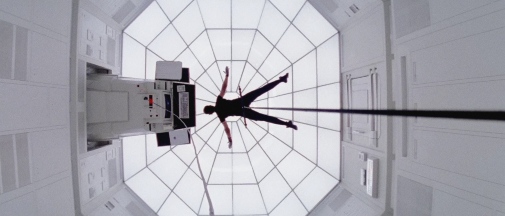
It all started with a bonafide superstar looking for his first project as producer, returning to his nostalgia for a show he used to watch as a kid. Between Paramount and Cruise/Wagner Productions, Mission: Impossible was conceived with an approach to action cinema that verges on improvisational. Director Brian De Palma went into pre-production without a script, sketching the story around locations and action set pieces. And so, all that happens in the first movie exists in structural service to its successive climaxes, a symphony of cascading suspense, violence, bombast.
A sense of paranoia pervades since the opening sequence, when Ethan Hunt's Impossible Missions Force team is decimated in Prague, leaving him under suspicion from his own agency and justifiably paranoid. As in many of his adventures, our young hero finds himself going rogue while untangling a conspiracy, here presented in shades of Le Carré by way of De Palma's beloved Hitchcock. This early Hunt is a coiled spring, devoid of much presence beyond his mechanical part in the director's engine.
He sustains a picture predicated on an individualistic narrative while embodying the kind of characterization made for a tale of collective effort. Rather than fumbling into dysfunction, these tensions aid the movie's gambit, as this is an exercise in mounting agitation more than a showcase for stunt work - that would come later in the series' history. De Palma's direction follows suit, slinky and elegant, tuned to a formalistic knell that reverberates through every frame and sonic landscape, from the blue haze of noirish night to the thick silence within a white room.
However, sharpness doesn't invalidate fun, and some of the artists involved are having a blast. In the cast, Vanessa Redgrave is a particular standout, savoring every line like a leopard in the thrill of the kill. She brings a taste of dangerous lust that'll be hard to come by once the series moves past the 2000s, her devilish delight a dream of self-satisfaction. Danny Elfman's score is similarly energized, taking cues from Lalo Schifrin to update his 60s themes and give them new life. The rocker-turned-score-smith molds classicism to spy thriller perfection.
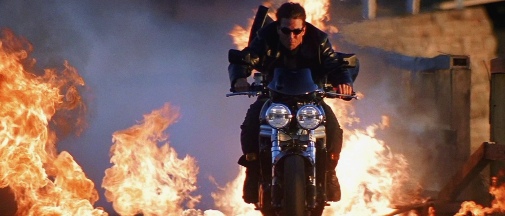
Only the final action set piece, a train sequence with awful CGI, significantly detracts from the experience. Though, for fans of the original show, some shameless twists may prove distasteful, so ready to renegade nostalgia and spit in the face of what came before. Perhaps because of that, when John Woo took charge of the sequel, the entire tone was revised, any shade of Euro sophistication vanquished to better sink into the depths of early-aughts maximalism. Watching it in 2023, the 2000's Mission: Impossible II looks impossibly dated to the point of endearment. It's charmingly ludicrous.
The only actors to reprise their roles from the first film to the sequel are Cruise and Ving Rhames, every other member of Ethan's theme left undeveloped for another dose of unadvised individualism. Thankfully, Thandiwe Newton is on hand to force some industrial-grade charisma into the contrived love story, while Woo's penchant for utmost sincerity means we can go to places other filmmakers might have deemed too goofy to function. There're slow-motion doves, explosions galore, the best use of masks in the franchise. Sadly, on a formal level, M:I-2 has nothing on its predecessor, falling victim to shoddy editing and bouts of arrhythmic indulgence.
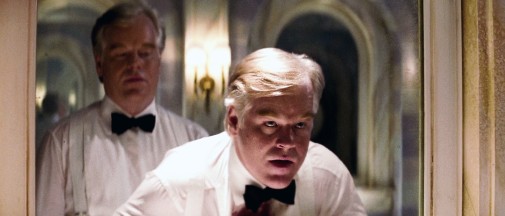
That said, compared to Mission: Impossible III, the first sequel's cutting is positively sedate, its camerawork stately. Guess that's what happens when you pass the baton to a novice cineaste. Making his feature debut, J.J. Abrams looks to the Bourne movies as De Palma and Woo might have regarded the James Bond pictures, going for a frenetic sloppiness that renders impressive choreography ineligible. From form to plot, the MacGuffin is so MacGuffin-y as to be insulting, and a newfound focus on Ethan's life outside the IMF paints a veneer of self-seriousness this franchise wasn't yet ready to embrace.
Once again, the music department comes to the rescue, with Michael Giacchino going back to the classics after Hans Zimmer's experiments under Woo went a tad astray. Varying between martial sonorities and full-blossomed romance, touching on notes of giddy joy, the score brings order to chaos. Another strong element is the antagonist, played by Philip Seymour Hoffman with detachment verging on disinterest. His approach evokes the mercuriality of someone so used to cruelty they're bored by their own viciousness - a chilling turn of popcorn villainy that singlehandedly makes the movie worth watching.
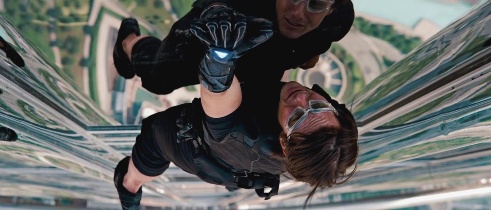
If the Mission Impossible saga had died with the third entry, it's hard to imagine the film-loving community mourning the loss with much zeal. However, it didn't perish with Abrams' 2006 mess, rising from the ashes like a phoenix reborn. 2011's Mission: Impossible – Ghost Protocol marks Brad Bird's leap from animation to live-action, his knack for visual storytelling surviving the transition unscathed. Indeed, the fourth movie is when the franchise comes into its current identity, expanding its focus, for the first time, from Ethan to the team dynamics of his IFM crew. This results in some juicy competence porn for those inclined to find pleasure in such things.
Along its purviews of group heroism to the sound of jazzy syncopations, Ghost Protocol features brilliant cinematography by the great Robert Elswit, whose contribution to these movies can't be overstated. He's still the best cinematographer ever to shoot a Mission Impossible flick, figuring the perfect balance between blockbuster polish, spy smoothness, and the grit of heartfelt threat. No wonder they kept him for the following title, which, if possible, is even more dazzling. Though, of course, 2015's Rogue Nation can't count the skyscraper-scaling Dubai sequence among its treasures, giving Ghost Protocol a leg-up in many fans' rankings.
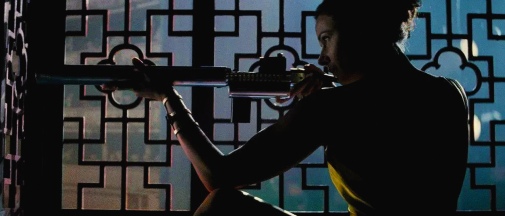
To me, however, the fifth movie remains the best of the bunch, partly because it's so beautifully consistent across the board. Bird's creation loses steam after the heights of the Burj Khalifa, while Christopher McQuarrie's first go at directing a Mission Impossible flick is a wonder of continuous tensions, moving forward with a perfect flux best exemplified by the opera scene where we first glimpse Ilsa Faust glowing in saffron satin. Unlike the many women who'd crossed paths with Ethan Hunt before, the MI6 agent persists in the franchise, character growing more intriguing with each new twist.
Along with Redgrave and Seymour Hoffman, Rebecca Ferguson's performance completes the Mission Impossible holy trinity of acting, a feat of enigmatic provocation of such assuredness you can practically feel gravity shift around her. Beyond the Hitchcockian stylings of the Turandot scene, the opening stunt hanging from a flying plane, and this miracle of a femme fatale, Rogue Nation still has more to offer. It's like a chest of infinite profundity, new wonders hiding in waiting until the next re-watch, beckoning the viewer's attention with promises of never-ending relish, a tonal balance closer to myth than mere Bondian copy.
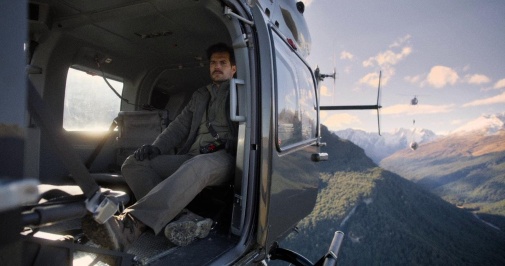
McQuarrie and Ferguson remain for 2018's Fallout, the least successfully scripted of the series' back half entries that also provides its most audacious construction with action-adventure idioms. In some ways, the entire project feels like it was devised to articulate set pieces in kaleidoscopic transformation, each ensuing gesture a new experiment in refashioning the screen into an adrenaline-pumping machine. Think back to the dive through storming clouds, the poetic painting of a white bathroom cracked grey and bloody, a city-wide chase in perpetual shapeshift, the contrast between grounded panic and airborne combat when nuclear annihilation seems inevitable.
Dead Reckoning - Part One is less daring in terms of sheer invention, though it manages to upend the precepts of a Mission Impossible car sequence, making it comedic and epic in equal measure. Hayley Atwell - in a role so big it's a near co-lead - does much to manage that lark. She further serves to keep things light while Cruise pulls the franchise toward material so heavy you can sense a black hole forming at the heart of each screening. In the face of the AI Armageddon, our so-called savior of moviegoing elevates computerized inhumanity to the level of dark divinity, a Leviathan with its maw opened, ready to devour the world.
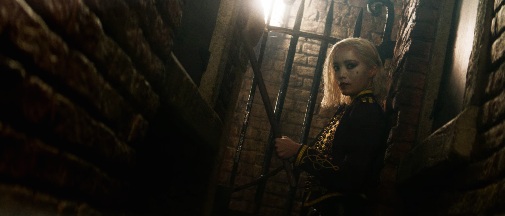
Against the dying of the light, Cruise rides forward atop his franchise steed, his godly enemy so monumental its human vassals feel inconsequent, trivial pounds of flesh to sacrifice for a greater evil. I wouldn't blame anyone for finding such grandiosity a problem, but I confess myself charmed by the story's ambitions, even as its weight presses down and the movie creaks. Maybe it's the ingenuity of the action. Maybe it's the quality of performances – Pom Klementieff is a nasty henchwoman, almost feral. Maybe it's the paradox of a Mission Impossible film shot in digital despite its anti-digital ethos, visual frissons echoing through the cinematic edifice.
Whatever the reasons for its success, Mission: Impossible – Dead Reckoning – Part One worked on me like gangbusters, passing so swiftly that its obscene runtime was hardly a hindrance. In the land of contemporary blockbusters, where that's a rare case, we must applaud filmmakers who thoroughly justify temporal excesses. Beyond it all, I felt moved by the movie's sorrowful scenario, this fatalistic wail that rang louder whenever the meta-cinematic properties of the saga rose above its latest attempts at giving Ethan Hunt multidimensionality. In other words, going into its eighth entry, the Mission Impossible movies are still a live-wire of possibility – I can't wait for Dead Reckoning: Part Two.
Are you a fan of the Mission Impossible movies? If so, how would you rank them?